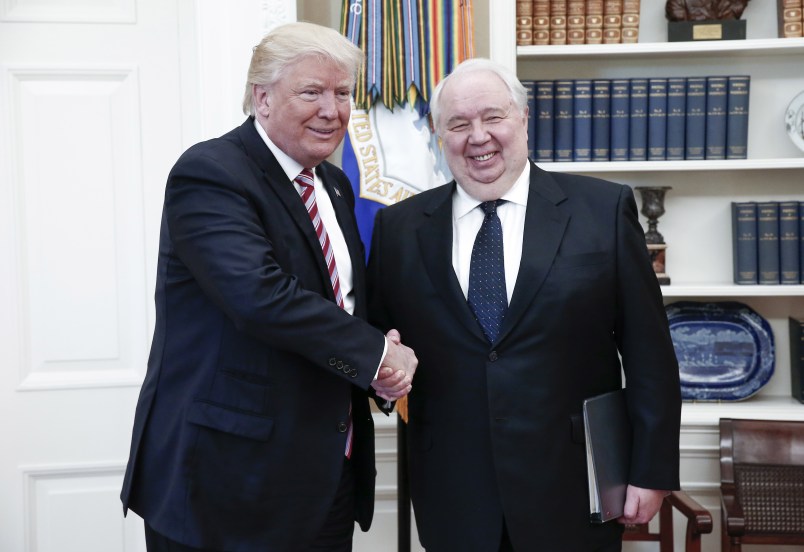The greatest conceit in public life today is the notion that we don’t already know President Trump is guilty. Guilty of what? Conspiring, by whatever level of directness, with a foreign power to win the Presidency and then continuing to cater to that foreign power either as payback for the assistance or out of fear of being exposed. In other words, collusion, a national betrayal that may break some statute laws but which far transcends them and isn’t in the past but is rather on-going.
It’s true that as a matter of courtroom, reasonable doubt legal proof we don’t yet know this. Or at least, we in the public don’t have all the necessary evidence. It’s possible that critical details are in the hands of the Special Counsel’s office or somewhere in the Intelligence apparatus. But that’s not really the point. These aren’t questions of criminal law. They might become questions of criminal law. But they’re not there yet. They are now simply political questions, meant in the sense that the country must make decisions about President Trump’s conduct and and whether he can be trusted with the truly vast powers of the Presidency.
The relevant concept is consciousness of guilt. We have all the evidence about various contacts between the Russian government and its cut-outs and the Trump campaign. We know about the Trump Tower meeting. We know about the meetings with George Papadopoulos. We know about Michael Flynn’s immediate move to start managing the payoffs to the Russia within hours of President Trump’s surprise win. We know there was “collusion”; we don’t know how high it went or just what Trump’s role was. Somehow we’re expected to believe that Trump himself was never informed about any of these actions. And that’s there’s no more to be uncovered in a truly unfettered public investigation. That’s a fascinating cat and mouse game. It will be fascinating to cover as a news story. It doesn’t matter for understanding what happened.
Here is where consciousness of guilt becomes so straightforward. From the very beginning the President has used every power at his disposal to stop investigations into what happened. He tried to end the investigation into Michael Flynn. He demanded loyalty and protection from the head of the FBI. He fired the head of the FBI because of the Russia probe. He told us it was about the Russia probe. He tried to fire Robert Mueller. He tried to bully Jeff Sessions into resigning so it would be easier to neutralize the investigation. He has been at more or less constant war with the FBI and the Intelligence Community. He openly dangles pardons to thwart the investigation. According to a Washington Post article published today, he’s now pushing ahead with revoking the security clearances of various former officials who were tied to the origins of the Russia investigation. He now says it’s about the Russia probe. In ordinary life, such flagrant and on-going efforts to prevent the truth from coming out are a clear sign of guilt. We rightly demand a higher standard before the criminal law because that is about taking away someone’s liberty. That’s not the case here. We’re only talking about taking away or restraining the power we have given him to use on our behalf.
In Joe Klein’s roman à clef “Primary Colors,” the Bill Clinton character “Jack Stanton” is forced to submit to a paternity test. It’s negative. He’s not the father. But then it emerges that Stanton submitted someone else’s blood. As the dialog between the characters explains, that doesn’t mean Stanton is the father. The key aide actually thinks he’s probably not. But he switched the blood sample because he wasn’t sure he wasn’t. Which was crystal clear evidence that he had the affair. That’s what mattered.
Take another analogy. You suspect someone has embezzled money from a company. You ask to see the company’s books. The suspect burns the books. They may have prevented you from learning the details. But they told you all you need to know. They’re guilty.
Trump is guilty. Why there’s such resistance to this reality is an interesting question. My own best guess is that it is too disquieting a reality to grapple with. Someone who has deliberately betrayed his country and who is compromised by and under the thumb of a foreign despot clearly should not be President. But his supporters don’t accept that. And as long as they don’t there’s no path to removing him from power prior to 2020 and maybe even beyond. That means that for the present we are locked in a situation in which we must operate in a system in which the person with the most power is working for a foreign adversary, whether out of avarice or fear. That is a profoundly uncomfortable reality. Remaining agnostic on the big question is more comfortable.
That’s my theory. But my theory, the why, doesn’t really matter. The fact that the reality is real and that it’s too hard for many to accept is what matters.








